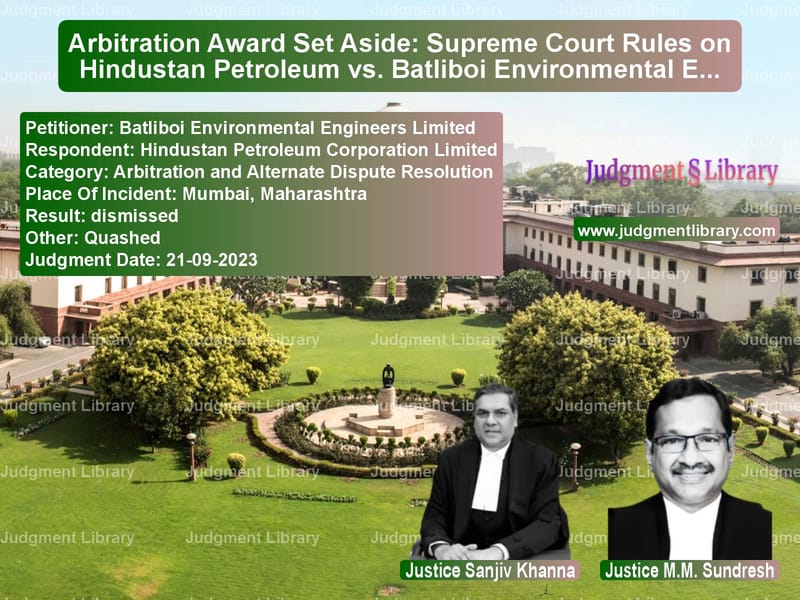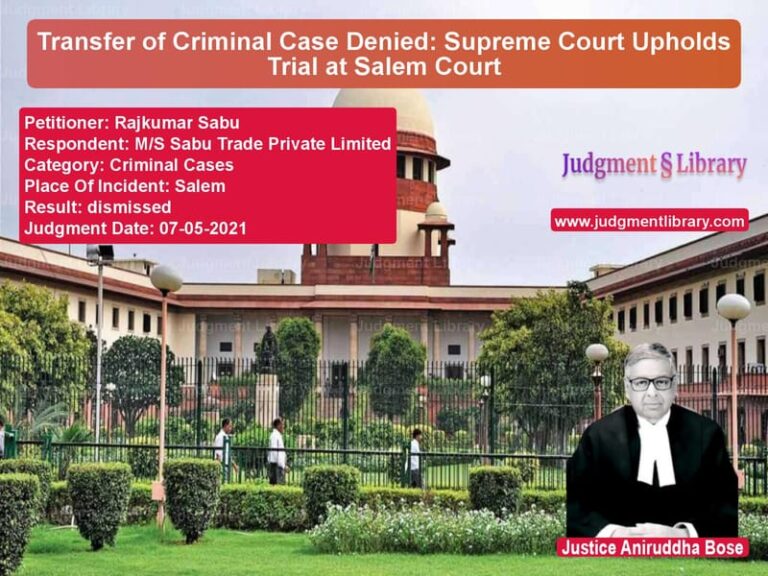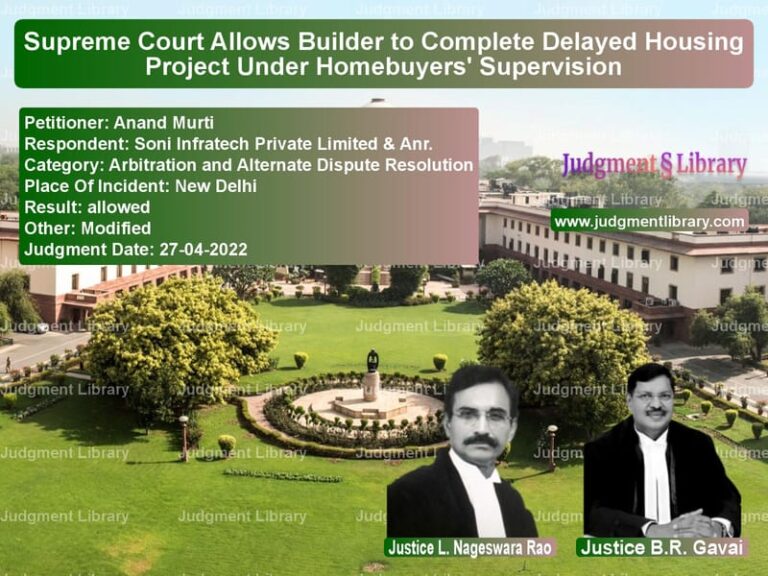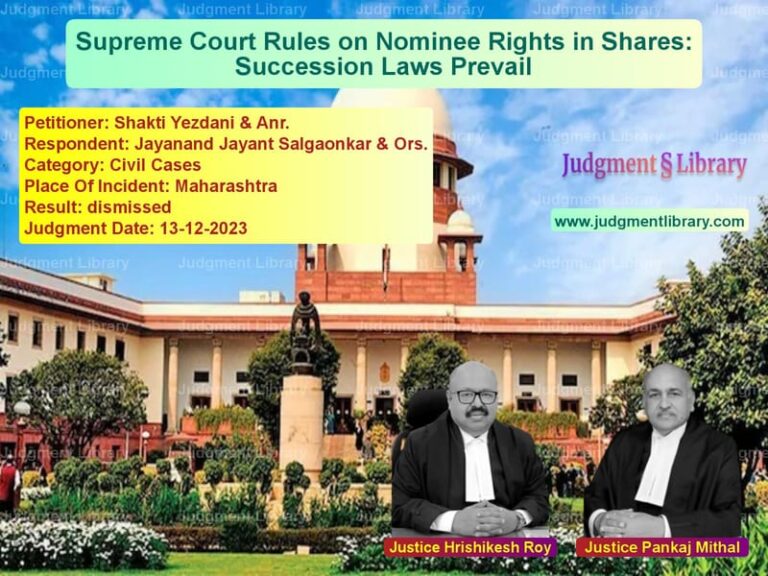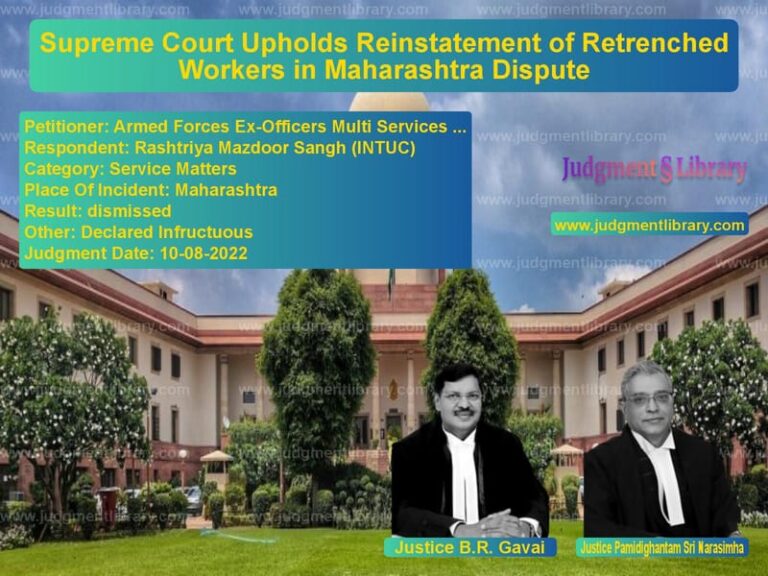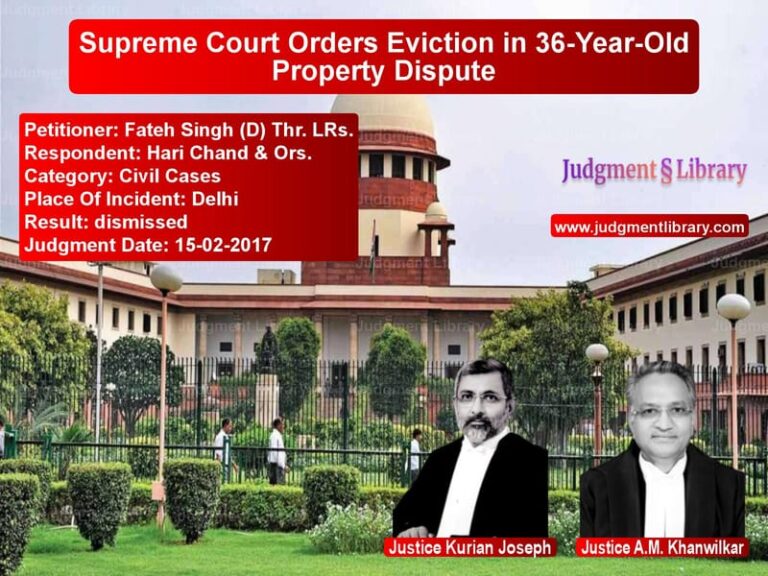Arbitration Award Set Aside: Supreme Court Rules on Hindustan Petroleum vs. Batliboi Environmental Engineers
The Supreme Court of India recently delivered a significant judgment in the case of Batliboi Environmental Engineers Limited (BEEL) vs. Hindustan Petroleum Corporation Limited (HPCL), dealing with the setting aside of an arbitral award under the Arbitration and Conciliation Act, 1996. The ruling clarifies the circumstances under which courts can intervene in arbitration awards, particularly when they are found to be perverse, irrational, or based on incorrect computations.
The Court dismissed BEEL’s appeal, affirming the Bombay High Court’s decision to set aside the arbitral award on the grounds that it lacked reasoning, contained patent errors, and awarded excessive and irrational damages. This judgment reinforces the principle that while courts should not interfere with arbitration awards in ordinary cases, they can step in when the award is fundamentally flawed and in violation of statutory provisions.
Background of the Case
The dispute arose from a contract between BEEL and HPCL for the construction of a sewage water reclamation plant at HPCL’s Mahul Refinery. The project, initially valued at ₹5.74 crores, was to be completed within 18 months. However, multiple delays extended the project timeline, leading to disputes over financial claims.
BEEL invoked arbitration, claiming ₹3.38 crores for loss of overheads and profit, ₹84.59 lakhs for idle machinery, ₹26.89 lakhs for increased material and labor costs, and ₹19 lakhs for extra work. The arbitrator awarded BEEL substantial compensation, holding HPCL responsible for project delays.
HPCL challenged the award in the Bombay High Court, which set it aside under Section 37 of the Arbitration and Conciliation Act, citing irrational conclusions, lack of reasoning, and double compensation. BEEL appealed this decision before the Supreme Court.
Key Legal Issues Considered
- Whether the arbitral award was justified in awarding damages without proper reasoning.
- Whether the High Court had overstepped its jurisdiction by interfering with the arbitrator’s decision.
- Whether the awarded compensation contained errors, including double payment.
- Whether the arbitral tribunal failed to apply established methods for calculating damages.
Petitioner’s Arguments (BEEL)
BEEL, represented by senior counsel, argued that:
- The High Court had exceeded its jurisdiction under Section 37 of the Arbitration Act by re-evaluating the evidence.
- The arbitral award was based on well-accepted industry formulas such as the Hudson, Emden, and Eichleay methods.
- HPCL was responsible for the project delays, justifying the compensation awarded.
- The principle of minimal judicial intervention should be upheld to maintain arbitration as an effective dispute resolution mechanism.
Respondent’s Arguments (HPCL)
HPCL countered these claims, arguing that:
- The award lacked a clear basis for calculating damages and included unjustified compensations.
- The arbitrator failed to assess BEEL’s actual losses and awarded compensation that led to double recovery.
- The High Court correctly applied the law, as the arbitrator’s decision was unreasonable and against public policy.
- BEEL had abandoned the project in 1996, leaving substantial work incomplete, making its claim for additional compensation unjustified.
Supreme Court’s Analysis
The Supreme Court examined the arbitral award and found multiple flaws:
- Absence of Reasoning: The arbitrator did not provide adequate explanations for awarding damages, violating Section 31(3) of the Arbitration Act.
- Double Recovery: The awarded compensation contained errors where BEEL was compensated twice for the same loss.
- Improper Use of Formulas: The arbitrator cited industry-standard formulas but failed to correctly apply them.
- Unreasonable Computation: The calculation of damages was arbitrary, making the award legally unsustainable.
The Court observed:
“The computation of damages should not be whimsical and absurd resulting in a windfall and bounty for one party at the expense of the other. The damages should commensurate with the loss sustained.”
The judgment further emphasized:
“When an award is found to be fundamentally flawed, courts are justified in intervening under Section 34 and 37 of the Arbitration Act. The principle of minimal interference does not apply to cases where the award is perverse, irrational, or patently illegal.”
Final Judgment
The Supreme Court upheld the Bombay High Court’s decision to set aside the arbitral award. It ruled that:
- The arbitrator had acted beyond the permissible limits by awarding excessive and unjustified compensation.
- The High Court was correct in intervening, as the award was legally untenable.
- BEEL’s claim for damages was flawed and lacked factual and legal justification.
- The arbitration tribunal failed to ensure that compensation was proportionate to actual losses.
The Court dismissed BEEL’s appeal, stating:
“In view of the aforesaid discussion, the appeal is dismissed without any order as to costs.”
Implications of the Judgment
- Reaffirms the principle that arbitration awards must be based on sound legal reasoning.
- Clarifies the scope of judicial intervention in arbitration under Sections 34 and 37 of the Arbitration Act.
- Prevents misuse of arbitration as a tool for securing disproportionate compensation.
- Ensures that compensation awarded in arbitration is fair, just, and based on credible calculations.
Conclusion
The Supreme Court’s ruling in this case strengthens the framework governing arbitration in India. While arbitration remains a preferred method for dispute resolution, this judgment highlights the importance of ensuring that arbitral awards are reasonable, well-reasoned, and free from legal errors. It serves as a crucial precedent for future arbitration cases, ensuring fairness and accountability in dispute resolution.
Petitioner Name: Batliboi Environmental Engineers Limited.Respondent Name: Hindustan Petroleum Corporation Limited.Judgment By: Justice Sanjiv Khanna, Justice M.M. Sundresh.Place Of Incident: Mumbai, Maharashtra.Judgment Date: 21-09-2023.
Don’t miss out on the full details! Download the complete judgment in PDF format below and gain valuable insights instantly!
Download Judgment: batliboi-environment-vs-hindustan-petroleum-supreme-court-of-india-judgment-dated-21-09-2023.pdf
Directly Download Judgment: Directly download this Judgment
See all petitions in Arbitration Awards
See all petitions in Dispute Resolution Mechanisms
See all petitions in Institutional Arbitration
See all petitions in Judgment by Sanjiv Khanna
See all petitions in Judgment by M.M. Sundresh
See all petitions in dismissed
See all petitions in Quashed
See all petitions in supreme court of India judgments September 2023
See all petitions in 2023 judgments
See all posts in Arbitration and Alternate Dispute Resolution Category
See all allowed petitions in Arbitration and Alternate Dispute Resolution Category
See all Dismissed petitions in Arbitration and Alternate Dispute Resolution Category
See all partially allowed petitions in Arbitration and Alternate Dispute Resolution Category

